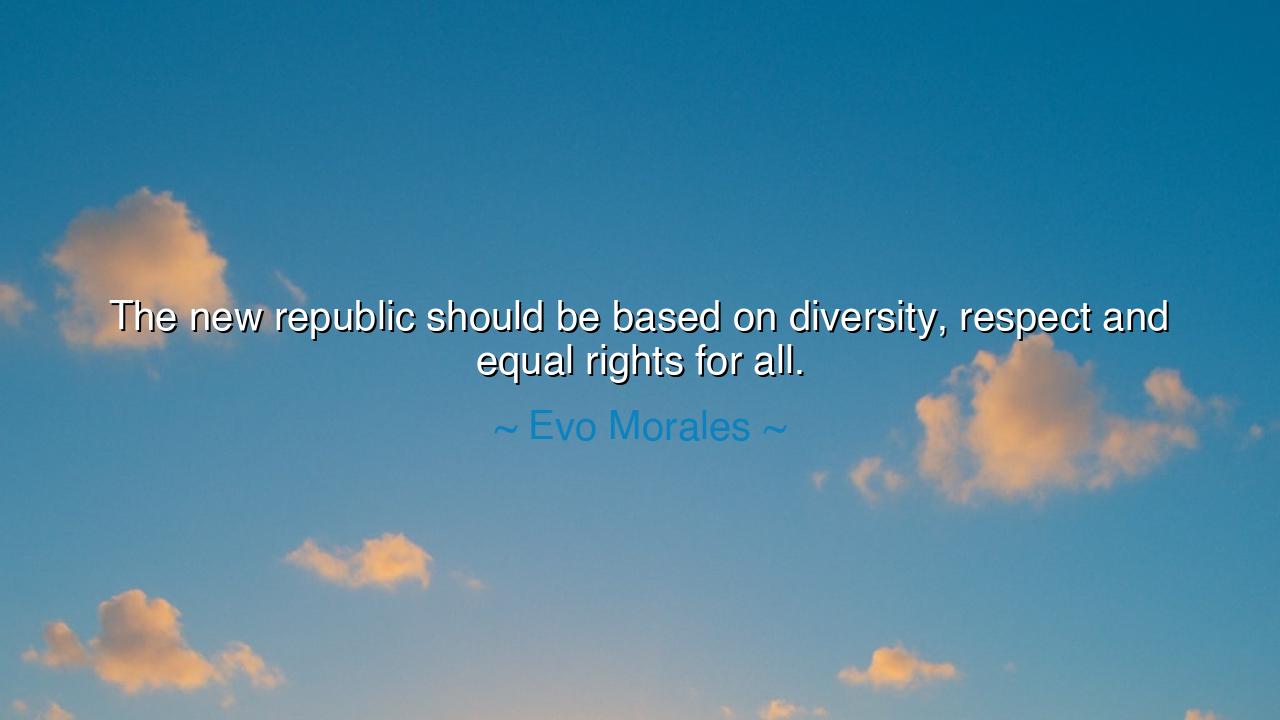
The new republic should be based on diversity, respect and equal






The words of Evo Morales—“The new republic should be based on diversity, respect and equal rights for all.”—ring like the proclamation of a herald announcing not merely political reform, but the renewal of a sacred covenant among people. They remind us that a republic is not only an arrangement of institutions and laws, but a living bond between souls. If it is built on oppression or exclusion, it rots from within. If it is built on diversity, respect, and equal rights, it flourishes, becoming not a fortress for the few but a home for the many.
At the heart of Morales’s words lies the recognition of diversity as strength. Too often in history, rulers sought to erase differences, to impose uniformity, to crush the voices of the marginalized. But diversity is not weakness; it is richness. A republic woven of many colors is like a great tapestry: strong, beautiful, and enduring. By calling for diversity, Morales speaks with the wisdom of the ancients, who knew that harmony does not arise from sameness but from balance, as many notes together form a single song.
The second pillar is respect. A republic without respect becomes tyranny disguised as order. Respect means more than mere tolerance—it means to see the dignity in every soul, to recognize in the stranger, the poor, the outsider, the same worth that shines in kings and nobles. The Greeks called this philotimo, a love of honor that compelled them to treat others with reverence. Without respect, even the noblest law becomes brittle; with it, even the simplest community becomes unshakable.
The third pillar is equal rights. History has shown that no republic can endure when rights are hoarded by the few. The Roman Republic faltered when its citizens were divided into classes of privilege, until rebellion tore it apart. In contrast, the American civil rights movement of the 20th century proved that expanding rights strengthens rather than weakens the state. Morales’s vision is thus rooted in an eternal truth: equality is not a gift from rulers to the ruled, but the foundation stone of freedom itself.
Consider the example of the South African struggle against apartheid. For decades, the republic was built on exclusion and injustice, denying the majority of its people their voice. But through struggle, sacrifice, and the leadership of figures like Nelson Mandela, a new republic emerged—one striving toward diversity, respect, and equal rights. Though imperfect, it embodied Morales’s wisdom: that only by honoring all can a nation heal and rise.
The emotional force of Morales’s words lies in their forward-looking spirit. He does not speak of the republic as it was, chained by old injustices, but as it should be, renewed and reborn. This echoes the prophetic voices of history: Moses leading his people to a promised land, Bolívar dreaming of a liberated South America, Lincoln declaring a “new birth of freedom.” Morales’s teaching belongs to this lineage, reminding us that every generation must remake its republic upon higher principles.
The lesson for us is clear: build your communities, your nations, your lives on diversity, respect, and equality. Practically, this means honoring the voices of those who differ from us, defending the rights of the vulnerable, and practicing daily respect in how we treat family, neighbors, and strangers alike. A republic begins not only in parliaments and palaces, but in the hearts and actions of its citizens.
Thus, Morales’s words stand as a beacon to future generations: a true republic is not the rule of some over others, but the shared life of all, bound by justice and respect. Let this be remembered—that when nations are built on these foundations, they rise like mountains; but when they are built on oppression, they crumble like sand. Diversity is strength, respect is peace, and equal rights are freedom. In these, the republic becomes eternal.






AAdministratorAdministrator
Welcome, honored guests. Please leave a comment, we will respond soon